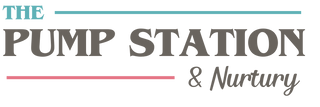NEW PRODUCTS AND CLASSES THROUGHOUT OUR STORE!
- Shop The Store
- Gift Cards & Gifts
- Create/Find Gift Registry
- Pump Station & Nurtury Favorites
- Baby Care Essentials
- Baby Clothing & Accessories
- Car Seats & Gear
- Nursing & Feeding
- Toys & Books
- Shop Kudos Diapers w/ Exclusive Discount!
- By Brand/ Collection
- Baby Care Essentials
- Bathing
- Diapering
- Sleep & Swaddling
- Soothing
- Skin Care
- Health & Wellness
- Safety
- Potty Training
- Baby Clothing & Accessories
- Converter Gowns, Footies & Onesies
- Layette
- Fashion Apparel
- Accessories
- Sweaters & Jackets
- Swim & Sun
- Nursing & Feeding
- Bottles, Nipples & Brushes
- Breast Comfort & Care
- Breast Pumps
- Breast Pump Parts
- Breastmilk Storage & Containers
- Lactation Supplements
- Nursing Pillows & Stools
- Nursing Bras & Clothing
- Bibs & Burp Cloths
- Baby & Toddler Feeding
- Health & Wellness for Mom
- Toys & Books
- Gifts For Baby
- Bath Toys
- Developmental Toys
- Musical Toys
- Pretend Play
- Books & Puzzles
- Stuffed Animals
- Shop Car Seats & Gear
- Shop Car Seats
- Car Seats: Info and Help Library
- Create/Find Gift Registry
- Shop Strollers
- Bassinets & Cribs
- Buy or Rent SNOO Smart Sleeper
- High Chairs
- Baby Carriers
- Bouncers
- Car Seat & Stroller Accessories
- Wagons
- Shop Car Seats
- Pick It Up ASAP/Get It Installed -
- Infant Car Seats
- Convertible Car Seats
- All-In-One Car Seats & Boosters
- Booster & Forward Facing
- Car Seats: Info and Help Library
- Shop Strollers
- Pick It Up ASAP/Get It Built-
- All Terrain & Jogging Strollers
- Single Strollers
- Double Strollers
- Travel Strollers
- Stroller Travel Systems
- Before Baby
- Create Your Gift Registry
- Prenatal Classes
- Concierge Services & In-Home Support
- Buy or Rent SNOO Smart Sleeper
- Parenting Information and Help Library
- Prenatal Classes
- Baby Care 101
- Introduction to Breastfeeding
- Childbirth Prep - 2 Monday Nights
- Pediatric CPR & Home Safety
- Sign Up Early - Parent & Me Classes
- New Grandparents Class - Virtual
- Sleep: Getting your newborn off to a great start - Virtual
- Puppy Love? Is your dog ready for your new baby?
- FREE Breastfeeding Support Group
- Concierge Services & In-Home Support
- Car Seat Installations
- Personal Shopper & Registry Support
- Postpartum Doula Services
- Mommy & Me Classes
- In Santa Monica
- In Los Angeles
- "My Parents & Me" Groups
- Music Together Group Classes
- Hot Topics Parenting Classes
- Our Preferred Partners
- Resources
- Hot Topics Parenting Classes
- Intro to Solids
- Sleep: Getting Your Newborn Off to a Good Start
- New Grandparents
- Puppy Love? Is your dog ready for your new baby?
- Our Preferred Partners
- Shop Kudos Diapers w/ Exclusive Discount
- Harvest Home - Charity Partner
- Licensed Child Care Providers in SM
- Connections For Children
- Educated Nannies
- Newborn Care
- Classes & Workshops
- Concierge Services & In Home Support
- Educated Nannies
- Parenting Information and Help Library
- Classes & Workshops
- Parent & Me
- Pediatric CPR & Home Safety - In Person
- Free Breastfeeding Support Group - Virtual
- Sleep: Your Newborn
- Intro to Solids
- Puppy Love? Is your dog ready for your new baby?
- Music Together Group Classes
- Breastfeeding
-
The founding mission of The Pump Station was to help new Moms on their breastfeeding journey. Our classes, lactation consults and product suggestions are best of class.
- Classes
- Lactation Consultations: Personal Help With Your Breastfeeding
- Breast Pumps For Sale
- Breast Pumps For Rent
- Breast Pump Parts
- Breastfeeding Information and Help Library
- More Resources


By completing this form, you are signing up to receive our emails and can unsubscribe at any time you wish.




